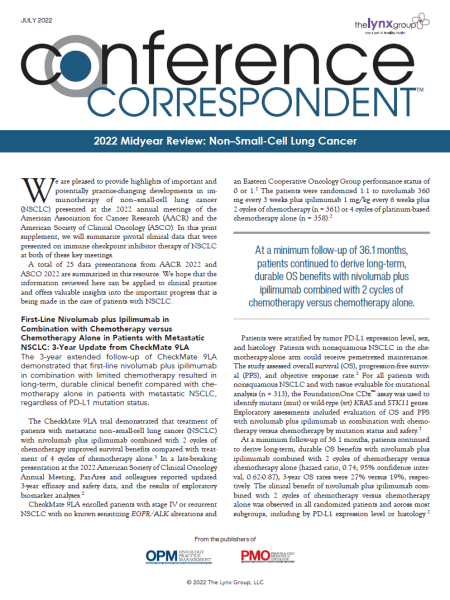Lurbinectedin is an effective second-line treatment for patients with advanced SCLC who have progressed after platinum-based chemotherapy.
There are few treatment options for patients with SCLC who progress after first-line platinum-containing therapy regimens.1 A phase 2 study was conducted to evaluate the activity and safety of lurbinectedin (Zepzelca), a selective inhibitor of oncogenic transcription, in patients with SCLC who progressed after receiving platinum-based chemotherapy.1
This single-arm, open-label, phase 2 basket trial enrolled adult patients in Europe and the United States who had a pathologically proven diagnosis of SCLC, ECOG performance status of ≤2, measurable disease per RECIST version 1.1, no brain metastasis, and adequate organ function.1 These patients received treatment with only 1 previous chemotherapy-containing regimen before study initiation.1
Treatment consisted of lurbinectedin (3.2 mg/m2) administered as a 1-hour intravenous infusion every 3 weeks until disease progression or unacceptable toxicity.1 The primary outcome of this study was the proportion of patients with an ORR, including complete or partial response, as assessed by investigators using RECIST criteria.1
Between October 2015 and January 2019, 105 patients with progressive SCLC were enrolled and treated with lurbinectedin. After median follow-up of 17.1 months, the ORR determined by investigator assessment was 35% (95% CI, 26%-45%).1 Median DOR was 5.3 months (95% CI, 4.1-6.4).2 Per independent review committee, the ORR was 30% (95% CI, 22%-40%) with median DOR of 5.1 months (95% CI, 4.9-6.4).2
The most common AEs (≥20%) were myelosuppression, fatigue, nausea, decreased appetite, musculoskeletal pain, constipation, dyspnea, vomiting, cough, and diarrhea.2 The most common grade 3 and 4 AEs included hematologic abnormalities, specifically neutropenia (46%), leukopenia (29%), anemia (9%), and thrombocytopenia (7%).1 Serious treatment-related AEs occurred in 10% of patients; neutropenia and febrile neutropenia were most frequent (5% each). No treatment-related deaths were reported.1
Researchers concluded that lurbinectedin is active as second-line therapy for SCLC in terms of ORR and had an acceptable and manageable safety profile.1 In June 2020, the US Food and Drug Administration granted lurbinectedin accelerated approval as a new treatment for patients with advanced SCLC who have progressed after platinum-based chemotherapy.2
References
1. Trigo J, Subbiah V, Besse B, et al. Lurbinectedin as second-line treatment for patients with small-cell lung cancer: a single-arm, open-label, phase 2 basket trial. Lancet Oncol. 2020;21:645-654.
2. US Food and Drug Administration. FDA grants accelerated approval to lurbinectedin for metastatic small cell lung cancer. June 16, 2020. www.fda.gov/drugs/drug-approvals-and-databases/fda-grants-accelerated-approval-lurbinectedin-metastatic-small-cell-lung-cancer. Accessed November 29, 2020.

